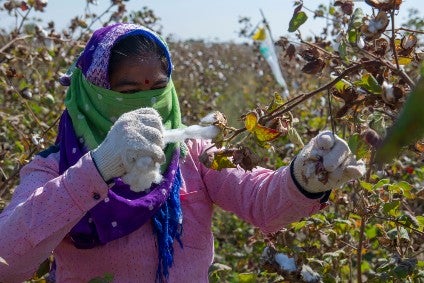
Value fashion chain Primark has expanded its sustainable cotton programme into a second major sourcing country – Pakistan – as the company looks to build on its work to trace the raw material through every stage of the supply chain and improve the lives of farmers.
The Sustainable Cotton programme launched in Gujarat, India’s biggest cotton and cottonseed producing state, around five years ago. Combining the expertise of agricultural expert CottonConnect and the Self Employed Women’s Association (SEWA), it offers on-the-ground training sessions and in-field training on farming techniques, seed selection, sowing, soil, water, pesticide management, picking, fibre quality, grading and storage.

Discover B2B Marketing That Performs
Combine business intelligence and editorial excellence to reach engaged professionals across 36 leading media platforms.
The cotton produced by the farmers has made its way into some of Primark’s pyjama designs – the value clothing retailer’s first line of clothing made using 100% sustainable cotton, and the first in which it is able to track its cotton through the supply chain from farm to store. And with zero cost implications.
One year on and 4.4m pairs of pyjamas have been made with the cotton from the programme, and Primark is now expanding the initiative into Pakistan – one of the key sourcing countries for cotton.
In the next step forward, Primark has been working with CottonConnect, alongside local NGO REEDS (the Rural Education and Economic Development Society), to introduce the programme into Pakistan. With an additional 20,000 farmers enrolled in the programme in Pakistan, over 30,000 farmers across both sourcing regions will be trained in sustainable farming methods by 2022.
Pakistan is already a key sourcing country for Primark. The country’s fertile landscape creates an optimal environment for cotton to grow, the fashion retailer says, with an established textile manufacturing industry in the region and strong trade routes to other markets.

US Tariffs are shifting - will you react or anticipate?
Don’t let policy changes catch you off guard. Stay proactive with real-time data and expert analysis.
By GlobalDataBuilding on the success of the programme that launched in Gujarat, which has so far seen more than 6,000 independent cotton farmers enrolled in the programme and an average profit increase of almost 200% for those who have completed their training, farmers in Pakistan can expect to take home increased profit and yield.
“We’re very proud of the Sustainable Cotton Programme, and we’re delighted to be able to use our experience in India to help train and support the farming community in Pakistan,” says Katharine Stewart, ethical trade and environmental sustainability director at Primark. “We’ve deliberately targeted regions that are already used by our suppliers, so we can introduce even more cotton grown using sustainable farming methods into our supply chain as soon as possible. Our expansion into Pakistan is the logical next step for us, as we continue to move towards 100% sustainable cotton in our supply chain.”
Paula Dumont Lopez, trading director at Primark, adds: “As we expand the programme, we’re looking forward to using more and more sustainable cotton across our clothing and homeware ranges.”
Click here to read an interview with Katharine Stewart in which she discusses how Primark is working to engage more closely with its supply chain.





